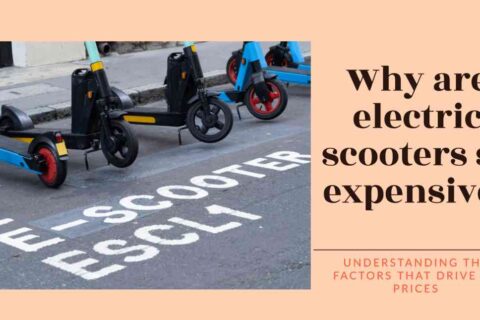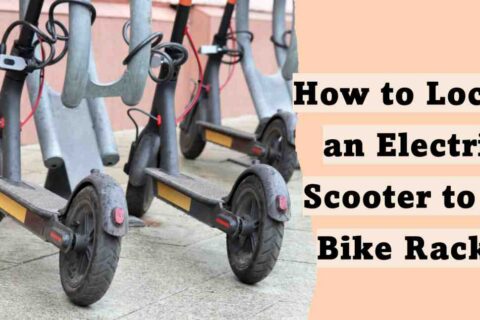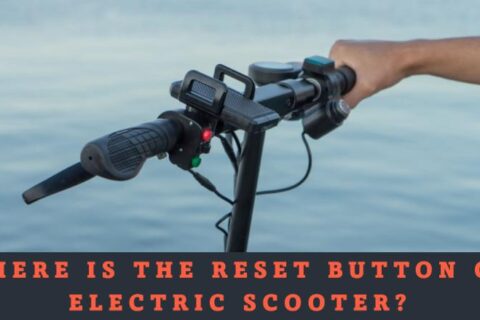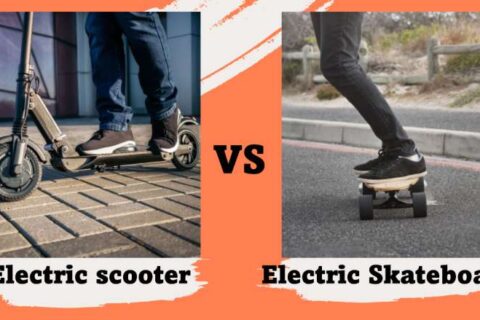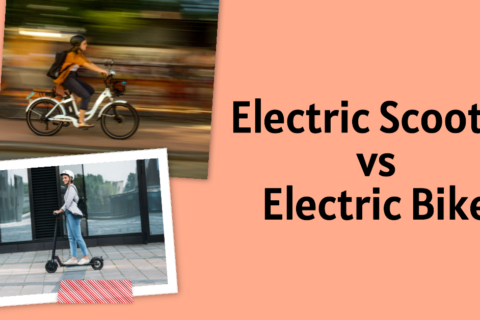In my opinion, electric scooter vs electric bike have gained immense curiosity as people seek eco-friendly and efficient means of transportation. In our detailed comparison, we explore the key distinctions between these two options to assist you in making an informed decision.
Electric scooters, known for their compact and lightweight design, excel in short urban commutes. They offer remarkable features such as quick acceleration and agile maneuverability, making them a preferred choice for navigating bustling city streets.
Conversely, electric bikes provide a more versatile and comfortable riding experience. With features like pedal assist and larger frames, they are well-suited for longer rides, allowing you to effortlessly conquer varied terrains.
By delving into the distinctive advantages and specifications of each option, you can discern which aligns better with your specific needs and preferences for the year.

Table of Contents
ToggleUnderstanding Electric Scooters
Features and Benefits of Electric Scooters
Electric scooters are the ultimate urban companions. Their compact size and lightweight design are game-changer for navigating through busy city streets. I remember zipping through traffic and reaching my office in record time, all thanks to the nimble maneuverability of my electric scooter.
But it’s not just about convenience; it’s about making a positive impact on the environment too. By choosing an electric scooter, you’re taking a small step towards a greener future. No emissions, no guilt – just a clean ride and a clear conscience.
What I love about electric scooters is their versatility. Adjustable handlebars and seats ensure a comfy fit for riders of all sizes. Plus, the foldable design makes them easy to carry and stow away. Trust me, having a scooter that fits your style and space is a game-changer.
And safety? Oh, they’ve got that covered too. LED lights keep you visible, and the responsive brakes provide that extra peace of mind when navigating busy streets. Oh, and don’t forget the smartphone connectivity – you’ll never get lost again!
So, whether you’re a city dweller commuting to work or just want to explore your neighborhood with a dash of fun, an electric scooter is your perfect ride. Fast, eco-friendly, and loaded with features – it’s time to join the e-scooter revolution!
Advantages of Electric Scooters Over Bikes
When it comes to personal transportation, electric scooters and electric bikes have become the go-to choices for eco-conscious commuters. But why are electric scooters winning the hearts of many? Let’s take about the reasons.
First off, electric scooters are sleek and nimble, perfect for zipping through busy streets. Unlike electric bikes, they offer unmatched maneuverability, effortlessly swerving through traffic and crowded areas. You’ll never have to worry about being stuck in a jam again.
Another perk is their quick acceleration. Electric scooters are all about speed, allowing you to leave others in the dust and reach your destination faster. Time is precious, and electric scooters make sure you make the most of it.
Cost-effectiveness is another box they tick. With a lower initial price and reduced maintenance costs, they’re a budget-friendly option. So, you get an eco-friendly ride without breaking the bank.
But let’s not forget the thrill factor! Riding an electric scooter is pure excitement. The wind in your hair, the city at your feet – it’s a rush like no other. You’ll find yourself looking forward to your commute every day.
So, if you crave a fun, efficient, and affordable way to get around town, electric scooters are the way to go. Embrace the joy of the ride and choose the eco-friendly future!
Read More: 7 Major Benefits of Electric Scooter
Key Specifications of Electric Scooters
When it comes to electric scooters, understanding the key specifications is essential to finding your perfect ride. Let’s break it down for you:
First up, motor power – it’s the heart of the scooter. Higher wattage means more speed and better acceleration. So, if you crave a thrilling ride and want to conquer challenging terrains, go for a higher-powered scooter.
Next, battery capacity – the juice that keeps you going. Bigger battery, longer range. If you’re all about long commutes or exploring the town without frequent pit stops, aim for a scooter with a larger battery.
Don’t forget the weight capacity – the max load it can handle. Check the specs to make sure it’s a good fit for you. Safety and comfort are paramount, especially if you’re carrying hefty stuff or have a larger build.
Now, brakes – your best friends when it comes to stopping. Mechanical brakes offer strong, reliable stops, while electronic brakes can recharge the battery as you slow down. Choose what suits your style and safety needs.
Lastly, consider the extras like tire size, suspension, folding mechanism, and cool add-ons like lights and bells. They all add up to a smoother, more convenient, and safer ride.
Understanding Electric Bikes
Electric Bikes: Features and Benefits
Electric bikes are not your ordinary bicycles. They blend technology and mobility seamlessly, thanks to their electric motors.
These motors provide varying levels of pedal assistance, allowing riders to conquer hills and cover longer distances with ease. Imagine effortlessly cruising up steep inclines or gliding through picturesque routes without breaking a sweat. Electric bikes make it all possible.
One of the standout advantages of electric bikes is their eco-friendliness. By choosing an e-bike instead of a gas-powered vehicle, you actively contribute to reducing carbon emissions and embracing sustainable transportation. It’s a small step that makes a big impact on the environment.
Additionally, to the electric motor, other factors to consider when choosing an electric bike include tire size, suspension system, folding mechanism, and additional accessories like lights, bells, and digital displays. These features enhance the overall comfort, convenience, and safety of your electric bike experience.
Electric Bike vs Scooter: Advantages of E-bikes
Electric bikes and scooters have both gained popularity as eco-friendly modes of transport. While scooters are nimble and best suited for short urban commutes, e-bikes offer a more versatile riding experience.
The pedal-assist feature in electric bikes allows riders to adjust the level of assistance, making it a perfect choice for longer rides and hilly terrains.
Compared to scooters, electric bikes also provide a more comfortable ride, thanks to their larger frames and ergonomic design.
The ability to pedal gives riders the freedom to choose between motor assistance and physical effort, making it an ideal option for fitness enthusiasts or those looking to enjoy the breeze without relying solely on motor power.
Key Specifications of Electric Bikes
Electric bikes come in various styles, catering to different riding preferences. From city commuters to off-road adventurers, there’s an e-bike for everyone. When choosing an electric bike, it’s essential to consider factors like motor power, battery capacity, and weight capacity.
The motor power typically ranges from 250 to 750 watts, with higher wattage translating to better speed and acceleration. Battery capacity, measured in watt-hours (Wh), determines the range the e-bike can cover on a single charge. A higher-capacity battery allows for longer journeys without worrying about recharging.
Weight capacity also plays a vital role, ensuring the e-bike can handle the load of the rider and any additional cargo. With varying specifications available, it’s essential to choose an electric bike that aligns with your riding needs and style.

Speed and Range Comparison
Speed Comparison of Electric Scooter vs Electric Bike
When it comes to choosing between an electric scooter and an electric bike, speed is undoubtedly a crucial factor for many urban commuters. We all want to get to our destinations quickly, zipping through busy streets with ease. Let’s delve into the speed comparison of these two eco-friendly transport options.
Electric Scooters:
Electric scooters are known for their nimbleness and agility, and this extends to their speed capabilities as well. Most electric scooters in the market today can reach speeds ranging from 15 to 20 mph (24 to 32 km/h). It’s like having your personal speedy companion that effortlessly weaves through traffic, leaving traditional bicycles in the dust.
Electric Bikes:
Electric bikes, also known as e-bikes, have also come a long way in terms of speed. Depending on the model and type, electric bikes can reach speeds anywhere from 20 to 28 mph (32 to 45 km/h). Thanks to pedal-assist technology, you can pedal along with the motor’s assistance, allowing you to cover more ground in less time.
Range Comparison between Scooters and E-bikes
Speed is one thing, but what about the distance these electric wonders can cover on a single charge? Range becomes a significant concern, especially for those with longer daily commutes or a penchant for weekend adventures.
Electric Scooters:
Electric scooters generally have a more modest range compared to electric bikes, making them ideal for short-distance commutes. On average, you can expect an electric scooter to travel anywhere from 15 to 30 miles (24 to 48 km) on a single charge. This is perfect for zipping around town, running errands, or exploring nearby neighborhoods.
Electric Bikes:
If you have longer journeys in mind, electric bikes take the lead in the range department. With their larger battery capacities, e-bikes can cover distances ranging from 25 to 75 miles (40 to 120 km) on a single charge, depending on factors like motor power, terrain, and level of pedal assistance. This makes electric bikes the ideal choice for adventurous souls who crave the freedom to roam beyond city limits.
Which Offers the Need for Speed and Longevity?
Choosing between an electric scooter and an electric bike ultimately boils down to your specific needs and preferences. If you prioritize quick and nimble rides for short urban commutes, the electric scooter’s compact design and moderate speed range might be the perfect fit for you.
On the other hand, if you yearn for longer excursions and the thrill of traveling greater distances, the electric bike’s extended range and pedal-assist feature will undoubtedly cater to your desires.
As a whole, both electric scooters and electric bikes offer their unique advantages, and the decision rests on your lifestyle, daily commute, and sense of adventure.
Whichever you choose, you’ll be embracing an eco-friendly mode of transportation that not only reduces your carbon footprint but also adds a dash of excitement and convenience to your everyday journeys.

Portability and Convenience
Evaluating the Portability of Electric Scooters
When it comes to navigating through the hustle and bustle of urban life, electric scooters emerge as the champions of portability and convenience.
Picture this: you’re running late for a meeting, and public transport is just too crowded. That’s where electric scooters swoop in to save the day.
These nifty little rides are incredibly lightweight and compact, making them an absolute breeze to carry around. You can effortlessly fold them up and tuck them under your desk or take them along with you on the subway. It’s like having your own personal magic carpet that you can whisk away whenever you please.
But it’s not just the portability that sets electric scooters apart; it’s the freedom they offer. With an electric scooter, you’re no longer bound by rigid schedules or confined to specific routes.
You can weave through narrow alleys, take shortcuts, and even explore pedestrian zones with ease. It’s a liberating feeling to know that you can swiftly glide past traffic jams and reach your destination in no time.
Portability of Electric Bikes
Now, let’s talk about electric bikes, the sleek two-wheelers that have taken the world by storm. Electric bikes are a fantastic choice for longer journeys and leisurely rides.
Their portability might not match that of electric scooters, but they do offer a unique advantage – you can still pedal them like traditional bicycles even when the motor is off. This means you won’t be stranded if the battery runs out during a long excursion.
While electric bikes may not be as compact as their scooter counterparts, they still come with foldable features in some models, making them more manageable for storage or transport.
Plus, with a sturdy bike lock, you can park them with peace of mind while you enjoy your favorite cafe or explore a scenic spot.
Electric Scooter vs Electric Bike: Conveniences of Each Option
So, which option reigns supreme in the realm of convenience? The answer lies in your lifestyle and daily needs. If you’re a city dweller who values agility and zipping through tight spaces, an electric scooter is the way to go. Its lightweight build and quick-fold mechanism make it the ideal companion for short, on-the-go trips.
On the other hand, if you love taking leisurely rides, going on weekend adventures, and don’t mind a bit of pedaling, an electric bike might be your perfect match. It offers a comfortable and versatile riding experience, allowing you to embrace both the electric-powered ease and the classic joy of cycling.
Whether you choose an electric scooter or an electric bike, both options offer a greener, more efficient, and more fun-filled way to commute and explore the world around you. So, unchain that freedom, hop on your chosen ride, and let the wind carry you to new horizons. Your urban adventure awaits!

Cost Analysis: Initial Investment and Maintenance
Here’s an expanded version of the table comparing the initial investment and maintenance costs for electric scooter vs electric bike:
| Category | Electric Scooter | Electric Bike |
|---|---|---|
| Entry-level | You can purchase a quality entry-level electric scooter for around $500. | Reliable entry-level electric bikes start at around $1000. |
| Mid-range | At the mid-range price point, electric scooters remain more affordable compared to electric bikes. They typically range from $800 to $2000. | Electric bikes can vary in price depending on features and quality, starting from $1500 and reaching up to $5000 or more. |
| High-end | High-end electric scooters can range from $2000 to $5000 or more, offering advanced features and premium build quality. | High-end electric bikes can go beyond $5000, providing top-notch performance, advanced technologies, and premium components. |
| Maintenance | Electric scooters generally require less maintenance due to their simpler design and fewer moving parts. Routine maintenance may include tire changes, brake adjustments, and occasional battery replacements. | Electric bikes require more maintenance due to additional components like gears, chains, and brakes. Maintenance tasks can include lubricating chains, adjusting gears, and regular battery care. Servicing from a professional may also be required. |
Riding Experience and Comfort
Riding Experience with Electric Scooter
The main advantage of electric scooters is their compact and sleek design. They are built to be lightweight and agile, allowing you to effortlessly maneuver through traffic and crowded streets. The nimble nature of electric scooters gives you a sense of control and freedom, as you can easily swerve past obstacles and reach your destination with ease.
Riding Experience with Electric Bike
The key feature that contributes to the comfort of electric bikes is the pedal-assist system. This system amplifies your pedaling power, providing an extra boost when you need it most. It’s like having your personal cycling companion, making uphill climbs and long rides much more manageable. With electric bikes, you can enjoy the benefits of exercise while also reducing strain on your joints and muscles.
Electric Scooter vs Electric Bike: Which Offers a Seamless and Comfortable Ride?
When it comes to choosing between electric scooters and electric bikes for a seamless and comfortable ride, it ultimately depends on your personal preferences and specific needs. Electric scooters excel in urban environments, offering agility, style, and the thrill of zipping through city streets. On the other hand, electric bikes prioritize comfort, making them an excellent choice for long commutes or leisurely rides.
Consider factors such as your typical commuting distance, the terrain you’ll be riding on, and your preferred riding style. If you value compactness, maneuverability, and a trendy aesthetic, electric scooters are the way to go. On the contrary, if you prioritize a more relaxed and comfortable experience, especially for longer rides, electric bikes are the perfect fit.

Terrain Suitability and Versatility
Electric Scooters on Different Terrains
As the world embraces eco-friendly transportation, electric scooters have become a popular choice for urban commutes. Their compact design and nimble maneuverability make them ideal for zipping through crowded streets and reaching your destination with ease. But what about taking the road less traveled? Can electric scooters handle various terrains beyond the smooth city pavements?
While electric scooters excel in urban environments, their suitability on different terrains varies. Most electric scooters are designed for urban commuting, where they effortlessly glide over flat surfaces and conquer mild inclines. Their smaller wheels and suspension limitations, however, can pose challenges when faced with rough or uneven terrains.
For instance, tackling gravel or bumpy roads might feel a bit daunting on an electric scooter, as the smaller wheels may struggle to maintain stability and smoothness. Potholes and rocky surfaces can also be jarring experiences for riders, reducing comfort and control. If you’re an adventure seeker planning off-road escapades, an electric scooter might not be the best match.
Electric Bikes Across Various Landscapes
When it comes to tackling diverse terrains, electric bikes take the lead. Electric bikes, or e-bikes, come in various configurations, including city e-bikes, mountain e-bikes, and hybrid e-bikes. Each type is designed to conquer specific terrains with ease, making them versatile companions for different landscapes.
City e-bikes are akin to their scooter counterparts, excelling on city streets and well-paved surfaces. With larger wheels and improved suspension systems, they offer a comfortable ride even on mildly uneven roads. But where e-bikes truly shine is on rugged terrains.
Mountain e-bikes, equipped with sturdy frames, robust tires, and advanced suspension, are built to conquer challenging trails and steep inclines. Whether you’re venturing into the wilderness or exploring hilly landscapes, mountain e-bikes provide the power and stability needed for a thrilling off-road experience.
Hybrid e-bikes bridge the gap between city and mountain e-bikes, offering the flexibility to handle both smooth and rough terrains. These adaptable companions are perfect for riders who enjoy exploring various landscapes without limitations.
Frequently Asked Questions (FAQs)
Are electric scooters and electric bikes legal to ride on public roads?
The legality of electric scooters and electric bikes varies depending on the country, state, or local regulations. In many places, electric scooters and electric bikes are classified as bicycles or low-powered vehicles, allowing them to be ridden on public roads, bike lanes, and paths. However, it’s crucial to check the specific laws and regulations in your area before riding.
How far can electric scooters and electric bikes travel on a single charge?
The range of electric scooters and electric bikes depends on several factors, including battery capacity, motor power, rider weight, terrain, and speed. Generally, electric scooters have a range of around 15-40 miles (24-64 kilometers) per charge, while electric bikes can typically travel 20-80 miles (32-128 kilometers) or more, depending on the model and riding conditions.
How fast can electric scooters and electric bikes go?
The top speed of electric scooters and electric bikes varies based on motor power and local regulations. Electric scooters typically have speeds ranging from 15 to 30 mph (24 to 48 km/h), while electric bikes often have pedal-assist speeds up to 20 mph (32 km/h) or more. However, it’s important to abide by speed limits and local regulations for safe and legal riding.
What are the maintenance requirements for electric scooters and electric bikes?
Electric scooters and electric bikes generally have lower maintenance needs compared to traditional gasoline-powered vehicles. Regular maintenance includes checking tire pressure, inspecting brakes, keeping the battery charged, and ensuring all components are in good working condition. It’s also recommended to follow the manufacturer’s guidelines and schedule routine maintenance, such as battery replacements or software updates.
How long does it take to charge the battery of an electric scooter or electric bike?
Charging times vary depending on the battery capacity and charger specifications. On average, electric scooters and electric bikes take around 3 to 6 hours for a full charge. Some models may offer fast-charging capabilities, allowing you to recharge the battery in a shorter period.
Can I ride an electric scooter or electric bike in the rain?
Electric scooters and electric bikes are designed to be weather-resistant, but it’s essential to check the manufacturer’s specifications regarding water resistance. Most electric scooters and electric bikes can handle light rain and splashes. However, riding in heavy rain or through deep puddles may pose risks to the electrical components, so it’s advisable to avoid such conditions or take necessary precautions.
Can I ride an electric scooter or electric bike without pedaling?
Electric scooters are typically throttle-controlled, meaning you can ride them without pedaling. On the other hand, electric bikes require pedaling in most cases, as they are equipped with pedal-assist systems that provide electric assistance while pedaling. However, some electric bikes may have a throttle option for pure electric operation.
Conclusion
In conclusion, when it comes to choosing between electric scooters and electric bikes, it’s all about finding the right fit for your needs. Consider factors like how you’ll be using it, whether for quick city commutes or longer rides on various terrains.
Electric scooters are nimble and convenient, perfect for zipping around busy urban streets. On the other hand, electric bikes offer more range and versatility, great for exploring and tackling challenging routes.
Also, think about portability and storage, as scooters are compact and lightweight while bikes can be foldable or have removable batteries. Budget and maintenance costs are important too. Ultimately, it’s a personal choice based on your riding experience and comfort preferences.



